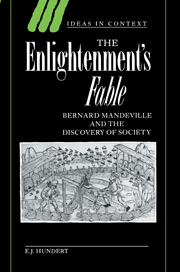Book contents
1 - The foundations of a project
Published online by Cambridge University Press: 23 November 2009
Summary
The Fable of the Bees was the Enlightenment's epitome of immoralism. Throughout the eighteenth century, Mandeville was seen as the most formidable modern critic of Christian moral psychology, the exemplary nihilist who applauded illimitable human desire, and the compelling satirist of contemporary codes of propriety. His work, more than any other, called into question fundamental standards of social behavior. To both his few admitted admirers and The Fable's legion of opponents, Mandeville's critique of inherited ideals of conduct was thought never fully to have been answered, not only in his own lifetime, but during the two generations after his death in 1732. Adam Smith, for example, was still revising his attack on The Fable in 1790, the last year of his life. Mandeville himself insisted that his distinctive amalgam of philosophy and satire had both a critical and constructive intention: to “pull off the disguises of artful men,” as he wrote in response to Bishop Berkeley, and to expose “the hidden springs” of human action to analytic inspection. His project of “anatomizing the invisible part of man” (1, 136) was designed to demonstrate that the vocabularies of formal systems of ethics served the essentially political and socializing purpose of deflecting critical attention from the irreducibly passionate and utterly self-regarding sources of actual human wishes.
- Type
- Chapter
- Information
- The Enlightenment's FableBernard Mandeville and the Discovery of Society, pp. 16 - 61Publisher: Cambridge University PressPrint publication year: 1994



